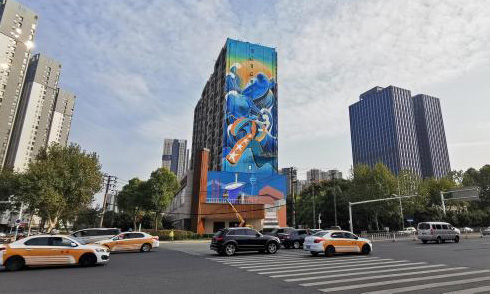RCEP trade to benefit recovery of world economy

Benjamas Tanvetyanont (right), consul-general of Thailand in Nanning, Guangxi Zhuang autonomous region, promotes products via livestreaming in Nanning on March 28. [Photo/China Daily]
Almost four months after the Regional Comprehensive Economic Partnership came into action, China-stationed foreign diplomats said the forms of intraregional trade will be further diversified and facilitated, enriching the Asia-Pacific region's economic vitality through inclusive and sustainable economic recovery amid the pandemic.
As the RCEP is a trade deal between the 10-member Association of Southeast Asian Nations and China, Japan, the Republic of Korea, Australia and New Zealand, they said the pact will reinforce regional trade and investment and help companies, especially small and medium-sized businesses, gain better access using both traditional and new foreign trade formats, including cross-border e-commerce and international trade, and boost global gross domestic product in a sizable market that covers a third of the world's population.
Eager to ship more products to China in the coming years, consul-generals of Vietnam, Thailand and Malaysia in Nanning, Guangxi Zhuang autonomous region, participated in a livestreaming event in late March to promote trade-related innovation and business ties between China and the ASEAN.
These diplomats promoted such products as Vietnamese coffee, Thailand's latex pillows and Malaysia's Musang King durian to domestic consumers and interacted with audiences online by partnering with a TikTok livestreamer.
The three consul-generals also recommended Guangxi specialties, such as jasmine tea, tangerines, edible bird's nests, medical supplies and luosifen rice noodles to Southeast Asian countries via Lazada, a cross-border e-commerce platform.
"Since the outbreak of the COVID-19 pandemic, more Thai consumers have taken a liking to online shopping. This event will further enhance trade ties between Thailand and Guangxi, as well as support the tangible growth of the RCEP," said Benjamas Tanvetyanont, Thailand's consul-general in Nanning.
According to Peng Jian, the organizer of the event and director of the foreign affairs office of the Nanning municipal government, the event was designed for diplomats to experience the development of cross-border business in Nanning and promote mutual prosperity with the implementation of the RCEP.
"Taking into account the pandemic situation, there is no better time for us to dive into the e-commerce sector where we are able to shop and also have a glimpse of the world around us and understand how other people live their lives by the products they use," said Azlimi Zakaria, consul-general of Malaysia in Nanning.
He said the cross-border e-commerce cooperation between Malaysia and China, particularly in Guangxi, is set to expand even further as both sides are fairly serious about the growth of this sector.
Backed by Malaysia's favorable natural conditions, the official added that the China-Malaysia Qinzhou Industrial Park-the flagship project of investment cooperation between the two countries-has already established a processing trade base for edible bird's nests in Guangxi.
At present, there are three preprocessing centers in Malaysia that have been registered overseas by China's General Administration of Customs. The trade base for edible bird's nests in the park is operated by 15 bird's nest production and processing companies, and 11 of them have been approved by the Chinese government for deep processing qualifications.
Do Nam Trung, consul-general of Vietnam in Nanning, said he would like to promote mutual understanding by displaying Vietnam's coffee culture to Chinese consumers.
As a new form of foreign trade, cross-border e-commerce has become an important driving force for stabilizing China's imports and exports, and has witnessed rapid growth despite the disruption of the COVID-19 pandemic. It surged from less than 1.2 trillion yuan ($187.05 billion) in 2018 to 1.98 trillion yuan in 2021, according to the General Administration of Customs.
With the China (Nanning) Comprehensive Cross-Border E-Commerce Pilot Zone starting operations in 2018, the park to date has attracted more than 100 companies to establish businesses within the zone. They reported a transaction volume of 7.77 billion yuan in 2021, up 259 percent year-on-year, according to the government of Guangxi.
Zhang Jianping, director-general of the Beijing-based China Center for Regional Economic Cooperation, said closer ties among the RCEP signatory countries will not only have a far-reaching impact on regional trade, investment and market integration but also help the recovery of the global economy.
Photos
 World Book Day: Let's read together
World Book Day: Let's read together Rare silver pheasants flock together in greater numbers to forage at Yishan nature reserve in east China's Jiangxi
Rare silver pheasants flock together in greater numbers to forage at Yishan nature reserve in east China's Jiangxi Young artist takes up brush to create lifelike paintings expressing mankind and nature’s harmonious co-existence
Young artist takes up brush to create lifelike paintings expressing mankind and nature’s harmonious co-existence Cutton farming in full swing in China's Xinjiang
Cutton farming in full swing in China's Xinjiang
Related Stories
- Economic Watch: Malaysia pushes ahead with economic recovery with eye on RCEP
- Interview: Boao Forum for Asia to kickstart key discussions on post-pandemic recovery: Malaysian expert
- Interview: Malaysia must seize opportunities to upgrade trade ties with RCEP members: Malaysian expert
- RCEP adds new impetus to export-oriented economy of China's coastal city
- RCEP boosts trade among member countries
Copyright © 2022 People's Daily Online. All Rights Reserved.






